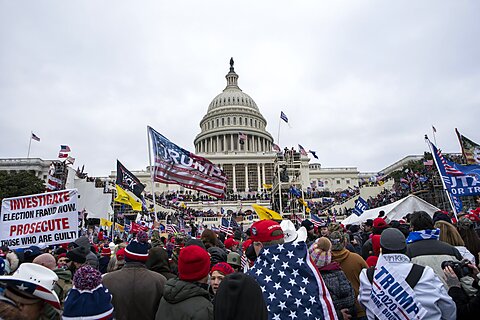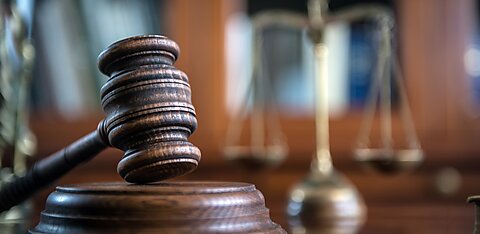
Two legal developments in the prosecutions of of former President Donald Trump have understandably commanded widespread attention in recent days, the start of the New York “hush‐money” trial last week, and the Supreme Court’s oral argument Thursday over the proper scope, if any, of presidential immunity. But another recent item on the Trump docket from early in the month deserves at least a bit of attention. It passed as a one‐day story that drew no real notice from legal commentators, and it tends to confirm that one of the most vocally argued‐over issues in the Trump prosecutions has been settled.
The claim at the time was that the former president and his allies had simply been exercising their First Amendment rights concerning the 2020 presidential election. After all, it was argued, the Amendment protects both the right of political speech (“This election was rigged, and we were robbed”) and the right to petition the government for redress (“These vote totals can’t be believed, do something about it!”). The defendants were simply saying and asking for things, the argument went, and under the First Amendment how can either of those be a crime?
But as I wrote at the time:
It is long established and ordinarily uncontroversial that speech can lose the protection of the First Amendment if, for example, it seeks to intimidate a public official into shirking a legal duty, or if it consists of the submission of forged documents to a government agency, or if it solicits or facilitates crime generally.… Speech that is part of a conspiracy to accomplish those things may be unprotected as well.
And here, regarding claims that the federal indictment was seeking to punish what was no worse than an outlandish instance of political speech:
It is widely agreed that the First Amendment protects some telling of lies for political benefit, and also that it protects (as, in effect, lobbying) some efforts to persuade government officials to carry out acts that are wicked and unconstitutional. It is equally certain that the First Amendment does not protect every act of speech or persuasion that someone might retroactively try to jam into these categories.
Now, in a ruling April 4, Georgia Superior Court Judge Scott McAfee has flatly rejected a motion by Trump and 14 co‐defendants to dismiss the charges in that state’s January 6 indictment on First Amendment grounds. Judge McAfee noted, citing the Alvarez (stolen valor) and Stevens (depictions of animal cruelty) cases, that the categories of speech excluded from First Amendment protection
include speech integral to criminal conduct, fraud, or speech presenting an imminent threat that the government can prevent. Restrictions on “speech integral to criminal conduct … ‘have never been thought to raise any Constitutional problem[.]’”
In similar manner, the judge wrote, “the law does not insulate speech allegedly made during fraudulent or criminal conduct from prosecution under the guise of petitioning the government.”
Both the federal and the Georgia prosecutions rest squarely on Trump and other defendants’ alleged violation of specific laws. (The list of federal ones is here.) The Georgia charges, which unlike the federal includes counts arising from the local marshaling of a bogus elector slate, rely on alleged violations of specific state laws including O.C.G.A. § 16–10-23 (making it a crime for an individual to “falsely hold[] himself or herself out as a [] public officer or employee with intent to mislead another into believing that he or she is actually such officer”); O.C.G.A. § 16–9‑1(b) (forgery in the first degree, when “with the intent to defraud he or she knowingly makes, alters, or possesses any writing, other than a check, in a fictitious name or in such manner that the writing as made or altered purports to have been made … by authority of one who did not give such authority and utters or delivers such writing”); O.C.G.A. §§ 16–10-20 (false statements and writings), and O.C.G.A. §§ 16–10-20.1 (filing false documents)
To be sure, Judge McAfee also specified that at this pretrial stage he was required to interpret the indictment’s language in a way favorable to its validity, and also left room for the defense to raise as‐applied challenges later after the establishment of an appropriate factual record—both normal and fine at this stage. But he also wrote: “the Court finds that the Defendants’ expressions and speech are alleged to have been made in furtherance of criminal activity and constitute false statements knowingly and willfully made in matters within a government agency’s jurisdiction which threaten to deceive and harm the government.”
This is anything but new. In fact, in her order last December denying Trump’s motion to dismiss, Judge Tanya Chutkan of the federal district court ruled to similar effect regarding the federal charges. That part of her ruling, however, tended to get lost in the coverage of the presidential immunity issues on which she ruled at the same time. And now the essentially identical ruling from Judge McAfee—who reportedly served as officer of his Federalist Society chapter while a law student—should underline that Chutkan’s handling of the First Amendment issues was not unusual.
Trump and his co‐defendants will have other arguments and defenses to offer. But the argument that their alleged conduct falls within the bounds of First Amendment protected conduct should now, I think, be seen as laid to rest.



